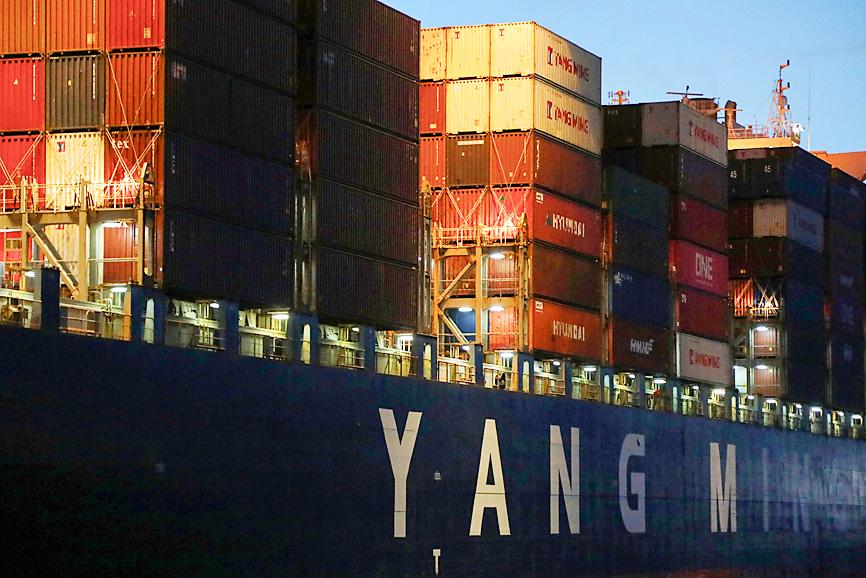Yang Ming Marine Transport Corp (陽明海運) shares rose 33.91 percent last week, ending at their highest level in nine years on Friday, buoyed by better-than-expected profit last month.
The container shipper reported that net profit last month increased 739.48 percent year-on-year to NT$2.71 billion (US$95 million), which was almost as much as the NT$2.74 billion profit it made in the third quarter, Yang Ming said in a regulatory filing on Thursday.
Earnings per share were NT$0.92 last month, compared with NT$1.05 last quarter, while revenue reached NT$15.27 billion, up 29 percent from a year earlier, the company said.

Photo: Ann Wang, Reuters
Yang Ming shares rose 10 percent, the daily maximum, on Friday to close at NT$23.1, the highest since June 2011, Taiwan Stock Exchange data showed. So far this year, they have surged 220.4 percent.
Capital Investment Management Corp (群益投顧) on Friday retained its “buy” rating on the stock, with a target price of NT$25, as the container shipping sector’s supply-demand dynamics and order outlook are moving in positive directions, it said.
Yang Ming posted net losses of NT$818.36 million in the first quarter and NT$67.53 million in the second quarter, but the company turned profitable in the third quarter on the back of rising freight rates as demand for inventory replenishment bolstered freight volume, while shortfalls in labor and truck-trailer chassis due to the COVID-19 pandemic drive a container shortage.
Container shippers and sea transport companies are experiencing a once-in-a-century boom this year, driven by household product demand from the stay-at-home economy amid the pandemic and a shift to spending more on consumer products due to travel restrictions, analysts said.
While the container shortage has boosted freight rates on European routes, China’s removal of restrictions on freight rate hikes for US routes might cause rates to rise further in the short term to support shippers’ earnings, they said.
“Due to a surge in new infections, many governments have reimplemented lockdowns. Congestion at ports and higher demand for life necessities and healthcare supplies have caused shipping capacity to remain relatively tight,” Capital said in a research note.
“In addition, freight load factors of various routes have remained at 100 percent, which have in turn persistently boosted the freight rates of European routes to new highs,” it said.
In the year to date, freight rates on European routes have increased by 202.4 percent, while rates on US east and west coast routes have grown by 90.2 percent and 172 percent respectively, according to data compiled by Capital.
Yang Ming’s revenue this quarter should stay robust due to demand for inventory replenishment of household and consumer products, as well as the persistent container shortage, while fourth-quarter profit is estimated to increase to NT$6.66 billion, or earnings per share of NT$2.54, Capital said.
The company’s profit for this year would likely hit a 10-year high, as Capital forecast net profit of NT$8.51 billion, or earnings per share of NT$2.91.

SEEKING CLARITY: Washington should not adopt measures that create uncertainties for ‘existing semiconductor investments,’ TSMC said referring to its US$165 billion in the US Taiwan Semiconductor Manufacturing Co (TSMC, 台積電) told the US that any future tariffs on Taiwanese semiconductors could reduce demand for chips and derail its pledge to increase its investment in Arizona. “New import restrictions could jeopardize current US leadership in the competitive technology industry and create uncertainties for many committed semiconductor capital projects in the US, including TSMC Arizona’s significant investment plan in Phoenix,” the chipmaker wrote in a letter to the US Department of Commerce. TSMC issued the warning in response to a solicitation for comments by the department on a possible tariff on semiconductor imports by US President Donald Trump’s

‘FAILED EXPORT CONTROLS’: Jensen Huang said that Washington should maximize the speed of AI diffusion, because not doing so would give competitors an advantage Nvidia Corp cofounder and chief executive officer Jensen Huang (黃仁勳) yesterday criticized the US government’s restrictions on exports of artificial intelligence (AI) chips to China, saying that the policy was a failure and would only spur China to accelerate AI development. The export controls gave China the spirit, motivation and government support to accelerate AI development, Huang told reporters at the Computex trade show in Taipei. The competition in China is already intense, given its strong software capabilities, extensive technology ecosystems and work efficiency, he said. “All in all, the export controls were a failure. The facts would suggest it,” he said. “The US

The government has launched a three-pronged strategy to attract local and international talent, aiming to position Taiwan as a new global hub following Nvidia Corp’s announcement that it has chosen Taipei as the site of its Taiwan headquarters. Nvidia cofounder and CEO Jensen Huang (黃仁勳) on Monday last week announced during his keynote speech at the Computex trade show in Taipei that the Nvidia Constellation, the company’s planned Taiwan headquarters, would be located in the Beitou-Shilin Technology Park (北投士林科技園區) in Taipei. Huang’s decision to establish a base in Taiwan is “primarily due to Taiwan’s talent pool and its strength in the semiconductor

French President Emmanuel Macron has expressed gratitude to Hon Hai Precision Industry Co (鴻海精密) for its plan to invest approximately 250 million euros (US$278 million) in a joint venture in France focused on the semiconductor and space industries. On his official X account on Tuesday, Macron thanked Hon Hai, also known globally as Foxconn Technology Group (富士康科技集團), for its investment projects announced at Choose France, a flagship economic summit held on Monday to attract foreign investment. In the post, Macron included a GIF displaying the national flag of the Republic of China (Taiwan), as he did for other foreign investors, including China-based